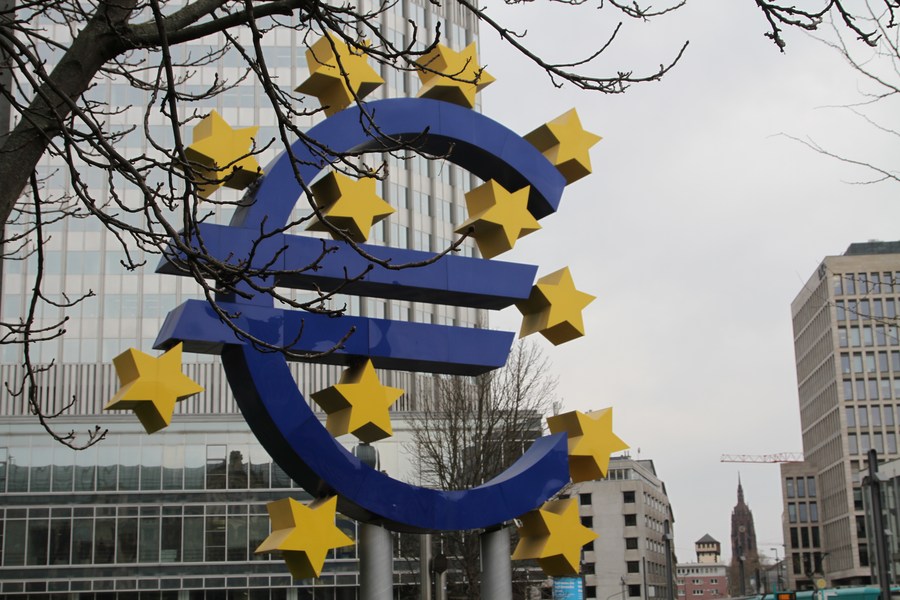European Central Bank slows pace of rate hikes amid lowering yet sticky inflation

Pedestrians walk on a business street in Brussels, Belgium, Jan. 3, 2023. (Xinhua/Zheng Huansong)
The European Central Bank decided on Thursday to lift main interest rates by another 25 basis points in a bid to bring down high inflation.
FRANKFURT, May 5 (Xinhua) -- The European Central Bank (ECB) decided on Thursday to lift main interest rates by another 25 basis points in a bid to bring down high inflation.
The central bank, tasked with maintaining price stability in the 20-member euro zone by keeping inflation below but close to 2 percent in the medium term, has implemented its seventh consecutive rate hike.
The decision to opt for a smaller increment after six consecutive rate hikes of 50 basis points or more has fueled speculation that the central bank may be approaching the end of its hiking cycle.
SEVEN HIKES IN A ROW
"The inflation outlook continues to be too high for too long," the central bank said.
The interest rate on the main refinancing operations and the interest rates on the marginal lending facility and the deposit facility will be increased to 3.75 percent, 4.00 percent and 3.25 percent respectively, with effect from May 10, 2023.
The interest rate of the deposit facility has been brought up to a level last seen in October 2008, historical data from the ECB show.
The ECB has increased its main interest rates seven times in a row since July 27, 2022, lifting interest rates by 375 basis points cumulatively.
"This is by far, the most aggressive monetary policy tightening cycle since the start of the monetary union," said Carsten Brzeski, ING Germany's chief economist.
The deposit rate is inching toward its historical high of 3.75 percent.

This photo taken on Feb. 24, 2023 shows the Euro sculpture in Frankfurt, Germany. (Xinhua/Shan Weiyi)
STICKY INFLATION
The wording of the ECB statement sends out a clear message about its resolve to bring down high inflation in the bloc.
"The Governing Council's future decisions will ensure that the policy rates will be brought to levels sufficiently restrictive to achieve a timely return of inflation to the 2 percent medium-term target and will be kept at those levels for as long as necessary," said the monetary policy decision statement.
Inflation in the euro area started to go up since the beginning of 2021 and continued to reach historical highs throughout 2022 when energy costs were soaring.
The annual inflation in the euro zone dropped from 8.5 percent in February to 6.9 percent in March. Latest flash estimates from the statistical office of the European Union (EU) show that the reading in April stood at 7 percent, still well above the ECB's target level.
"Headline inflation has declined over recent months, but underlying price pressures remain strong," said the ECB.
According to the ECB assessment, price pressures are still strong as gradual pass-through of past energy cost increases and supply bottlenecks are pushing inflation higher.

People shop at a store in Stockholm, Sweden, on Feb. 6, 2023. (Photo by Wei Xuechao/Xinhua)
END OF TIGHTENING CYCLE?
The ECB's monetary tightening has exerted downward pressure on economic growth in the euro area through various channels.
Firstly, the tightening cycle of the ECB, characterized by rate hikes and portfolio reduction, has pushed borrowing costs higher in the euro zone.
"...The latest results of the Bank Lending Survey have indicated that the rate hikes so far are leaving clear marks on the financing of the economy," Brzeski said in a note.
Secondly, the banking sector has also felt the heat of the rate hikes as several U.S. banks collapsed and some European banks were strained.
Moreover, for firms and households, loan growth has weakened owing to higher borrowing rates, tighter credit supply conditions and lower demand, the central bank noted.
Although ECB President Christine Lagarde insisted at the press conference that the 25-basis point hike does not mean a pause and there is still more ground to cover, speculations swirl that the central bank might be nearing the end of the tightening cycle.
Brzeski said it will be hard for the ECB to return to 50-basis point hikes in consideration of the lagged impact from previous hikes, banking turmoil, and subdued growth but still sticky inflation.
"All in all, with today's decision, the ECB has clearly entered the final stage of its tightening cycle," he said.
Photos
Related Stories
- UK food inflation hits record high in April
- Interview: Europe must not become vassal of U.S.: political expert
- Sharpest increase in European military spending in 3 decades: SIPRI
- Europe leaders' 'independent' stand comes as no surprise
- Europe must by no means become U.S. vassal, Croatian experts say
- Analysis: Reforms soften blow of Europe's banking crisis but risks remain
Copyright © 2023 People's Daily Online. All Rights Reserved.









